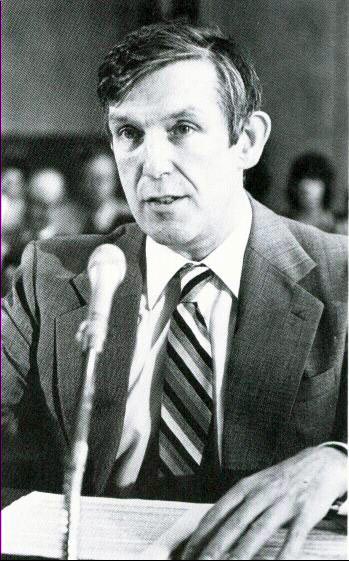National Arctic Science Policy Bill
 |
Senators Stevens and Murkowski at the D.C. hearings: bucking the OMB.
Stevens Blocks Administration Testimony at D.C. Hearings
New Bill Focuses on Research Coordination and Distribution
Senator Ted Stevens (R, Alaska) refused to accept Reagan administration testimony July 17 at a Senate Governmental Affairs Committee hearing on the proposed Arctic Research and Policy Act, S.B. 1562.
Angered at news that federal agency testimony had been altered by the Office of Management and Budget (OMB), Stevens conferenced with bill co-sponsors Murkowski (R-Alaska) and Jackson (D-Washington) just before the hearing and then announced his decision to refuse to hear testimony by the representatives of the Departments of Interior, State, Defense, and the U.S. Coast Guard, all present to testify.
“I am extremely disappointed (with) the OMB,” Stevens said. To use the power of the Office of’ Management and Budget to strike at the heart of the scientific community is going much too far. 1 intend to take this matter up with (OMB Director) Mr. Stockman and if we don’t get satisfaction from him, I’m going to ask for a meeting with the president,” Stevens said.
The media reported that the procedure of clearing administration testimony in advance with OMB has become standard procedure within the Reagan administration. The budget office has been known to edit prepared statements and to dictate stands for the agencies on a number of’ matters. But Stevens’ action refusing administration testimony at a Senate hearing was unprecedented, according to Capitol Hill observers, especially in view of his rank as Senate majority whip. His action stunned the agency representatives and others at the hearing.
Stevens said that he would have canceled the hearing except that Alaska Lt. Gov. Terry Miller and others had traveled to Washington to testify. The others included Dr. Juan Roederer, Director of the Geophysical Institute of’ the University of’ Alaska in Fairbanks; Roger Herrera, BPs Sohio Alaska Exploration Operations Manager; Hans-Pavia Rosing, President of the Inuit Circumpolar Conference (ICC); and Dr. Nancy Davis of Cultural Dynamics in Anchorage. Also testifying were Senators Henry Jackson (D. Washington) and Frank Murkowski (R. Alaska), who had introduced the bill.
Senator Jackson gave a short statement in which he referred to the study on Arctic research policy and the future role of the Naval Arctic Research Laboratory (NARL) which had been mandated by the Alaska National Interest Lands Conservation Act (ANILCA). He noted that the study points out that scientific information needs on important issues are accelerating in the Arctic, and special circumstances exist which make Arctic research politically sensitive and relatively expensive and difficult to conduct.
“There are three critical bases for an Arctic research program,” he said. “These are (1) sustained funding, (2) expert advice on program planning and management, and (3) an information center to serve as a repository of’ information and to quickly and efficiently disseminate the results of research to the public.”
On May 19, Murkowski had introduced the new bill as Amendment No. 1453 which offered the following changes:
Sec. 2. Findings and Purpose.
This introduction was re-written to more carefully define and limit the federal role in Arctic research (to the evident relief of the oil and gas industry). Besides stressing the economic and strategic importance of the Arctic to the U.S. this introduction specified those scientific tasks of direct interest to the federal government in the Arctic: renewable resources, global weather patterns, industrial pollution, human adaptation, and atmospheric conditions. The lack of coordination in U.S. Arctic research efforts was pointed up, along with emphasis on how far behind the U.S. is in comparison with other countries.
The purposes of the proposed Act were simply presented: to set up an Arctic Science Policy Council and an Arctic Research Commission to promote Arctic research; to establish a central system for the collection and retrieval of Arctic data; to establish a firm federal support base for funding Arctic research.
Sec. 3. The Arctic Science Policy Council.
The Arctic Research Council (formerly composed of the Secretary of Interior, Defense, and State), was renamed the Arctic Science Policy Council and is to consist of three members nominated by the Secretaries of Defense, Interior, Transportation, State, Commerce, and the Director of the National Science Foundation and to be appointed by the President. The Governor of Alaska is to be an ex officio member, as before. With this revision, the Council would serve more directly under the President.
Sec. 4. Duties of the Council.
The Arctic Research Council was relieved of its former duty of establishing a ”clearinghouse for all Arctic research” done by the federal government. Its chief tasks now are:
1. to facilitate research cooperation between the federal and state governments.
2. to coordinate Arctic research with other countries;
3. to develop and supervise an integrated national Arctic science policy:
4. to appoint the members of the Arctic Research Commission.
Sec. 5. Cooperation with the Council. This section was added requiring other federal agencies to cooperate with the Council in supplying nonproprietary data and reports. The Council was to use existing facilities and services of such agencies ”taking every feasible step to avoid duplication of research and efforts.”
“…there must be a format for the flow of information outward from the center to the Native and other residents and organizations in the Arctic, to international centers of science, and to all participants in Northern research and science… It could be capable of understanding different scientific efforts and could translate research findings and send them outward, across social groups, cultures, and across disciplines – .” -Nancy Yaws Davis
Sec. 6. The Arctic Research Commission.
What had been called the Advisory Committee in the first draft was as renamed the Arctic Research Commission and was as given many of the duties assigned to the Council in the former draft. The four-member Arctic Research Council would now be mainly responsible for supervising coordination and the development of national Arctic policy, while the Arctic Research Commission would be more directly involved in determining research priorities and disseminating research information.
Members of the Commission would include four persons of expertise in Arctic research (including at least one from the University of Alaska); two members are to be appointed who are representative of the interests of Arctic residents; two from private industry; and one from the Coast Guard.
Sec. 7. The Duties of the Commission. The Commission is mandated:
1. to study Arctic research for the purpose of determining priorities for future Arctic research;
2. to establish a data collection center and take responsibility for use and dissemination of Arctic research information;
3. to make grants for Arctic research, and
4. to consult with the Council on research activities, recommendations, and grants.
Finally, the Commission shall submit a report to Congress by March 31, 1983, making recommendations with respect to the continued operation of the Naval Arctic Research Laboratory at Pt. Barrow.
Sec. 8. The Administration of the Commission.
This section provides how the director and staff are to be appointed, and funding and contracts arranged.
Sec. 9. Funding.
The new draft expands funding provisions for the activities of the Arctic Science Policy Council and the Arctic Research Commission. It states that $25 million should be paid to the Council and the Commission each year, the funds to be taken from revenues from federal Arctic land and offshore sales and leases and from the General fund. The former draft limited funding to 1 percent of federal North Slope revenues. As in the earlier draft, the total amount in the fund shall not exceed $50 million at any one time.
Sec. 10. Naval Arctic Research Laboratory.
In the new draft, the Secretary of Defense is required to maintain the Naval Arctic Research Lab until 120 days after the Research Commission submits its report on the role of the lab.
Sec. 11. Definition.
Most significant in the new draft is the replacement of the words “North Slope” with the word “Arctic,” which is taken to include the Aleutian chain, the Arctic Ocean and the Beaufort, Bering, and Chukchi Seas, and is bordered on the south by the Porcupine, Yukon, and Kuskokwim Rivers. The new term not only expands federal revenue potential for Arctic research, but more accurately targets the field for Arctic research.
Back in the 1960’s, Alaska’s then-Senator E. L. “Bob” Bartlett, a member of the Senate Appropriations Committee, noted a disparity between the funding the U.S. directed toward the Antarctic compared with the Arctic. Then, as now, we are directing a significantly greater amount of funding toward scientific research in the Antarctic. Indeed, we have a scientific research policy in the Antarctic, mandated by administrative action. (OMB Circular A-5l). On the other hand, all attempts to administratively create and implement an Arctic science policy dating back to the 1960’s have failed. After a three-year effort, a U.S. policy statement agreed to by all concerned Federal agencies was still sitting unsigned on President Johnson’s desk when he left office in 1968.
That same year, at the request of the Department of State, the office of Science and Technology and the Federal Council of Science and Technology, the Interagency Arctic Research Coordinating Committee (IARCC) was established to ensure the sound development and coordination of Federal research programs in the Arctic. In the absence of guiding research policy, the IARCC foundered and was disbanded in1978.
In 1971, the National Security Council adopted an instrument (NSD Memorandum 144) to create an Interagency Arctic Policy Group to be established for a development of a coordinated plan for scientific research in and on the Arctic. This memorandum was reaffirmed by NSD Memorandum 202 in 1973. Despite the fact that these instruments mandated the creation of an Arctic research policy, no such policy exists today.
I would conclude this dissertation of the history of failure on the part of the executive agencies to arrive at an Arctic science policy administratively with the most recent example. The Interagency Arctic Policy Group (IAPG), the latest interagency group to be assembled to handle his problem administratively, drafted an Arctic Study Report which could have been the foundation of a comprehensive Arctic policy. In January 1982, the Department of Interior, one of ten Federal agencies represented on the IAPG, successfully stifled the final issuance of’ the IAPG report and undercut the attempts to create an Arctic policy administratively.
On September 2, 1981 – over ten months ago – OMB was invited to provide executive comment to the Committee on Governmental Affairs. No such comment has arrived. Instead, OMB has adopted a “behind the scenes” approach that I find extremely objectionable. A number of executive agencies with a stake in Arctic research were invited here to testify on this bill. A number of them — the State Department, the National Science Foundation, and the National Atmospheric and Oceanic Administration to name a few — understood the importance of this legislation and were prepared to come to the Hill and support it on the public record. As recently as late yesterday afternoon, the last of these agencies – the State Department – was informed by OMB that they could only testify in opposition to the bill. Another, the Coast Guard, has informed us that they could come only to answer technical, non-policy question related to Arctic research.
Though great strides in Arctic research have been made in the past fifteen years in certain key disciplines, we still lack the scientific background and engineering capability to achieve national benefits from Alaskan coal and strategic mineral development. The development of offshore oil and gas resources in ice-stressed seas faces similar constraints.
We still do not know enough about the population dynamics and behavior of the bowhead whale or caribou, the perpetuation of which are critical to the physical and cultural well-being of dependent Native peoples.
We lack knowledge of the potential impacts of offshore oil and gas developments upon our vast fisheries resources, which must form one of the mainstays of our economy after our oil is depleted.
We even lack an economically feasible technology for provision of reliable and sanitary water and waste disposal systems to citizens of our rural communities, many of whom remain among the most disadvantaged citizens of this Nation.
Miller went on to call for a greater role for Alaska State in the Arctic Science Policy Council. Because “the U.S. Arctic and Alaska are virtually synonymous,” he said, “it seems only reasonable that Alaska’s voice should be more strongly heard.” Accordingly, he recommended that an additional Presidential appointment be made to the Council from a list of nominees provided by the Governor. This appointee would have full powers on the Council.
Miller said that the Council should be required to consult with State entitles prior to setting or revising research policy and priorities. Also, the makeup of the Research Commission should reflect the fact that most Arctic research projects are conducted by the State of Alaska and the University of Alaska and that most researchers are Alaska residents.
The location of the proposed data collection center should be in Alaska, Miller said, and its establishment should make full use of existing facilities to avoid unnecessary duplications. Finally, Miller gave full support to the definition of Arctic as contained in the new draft, saying such areas as the Bering Sea and its adjacent onshore areas “are on the frontiers of engineering and environmental knowledge.”
Roederer claimed that scientific knowledge about the Arctic per se is often very special and is acquired at great cost with special logistic support. “The result of all this is that polar science is eminently interdisciplinary in nature, that polar phenomena and processes cannot be studied in isolation, that these studies are very expensive, that they have to compete with more traditional science endeavors at lower latitude, and that they often fall between the cracks of agencies and people’s frames of mind,” he stated.
Roederer stated that he has not found one active scientist in the field who does not agree that “there is a need for better coordination, more efficient information exchange, more adequate and stable funding base.., and a need for more training programs throughout American universities targeted on Arctic research.” He supported the amended bill as a major step in achieving those goals.
Roederer repeated the belief of most scientists that industrial development in the Arctic could only benefit by passage of the bill. “I do not share the fears that a national Arctic science policy would lead to increased industry regulations,” he said. “In my opinion, Mr. Chairman, it rather is ignorance and uncertainty that breed over regulation.”
 |
Roger Herrera of Sohio Alaska commended the current draft bill as “more practical and realistic in its methods of overseeing Arctic research, and it rightly establishes the reasons why it is pertinent for the United States of America to have a realistic Arctic policy.”
He went on to point out two weaknesses in the bill’s funding provisions. Stating that although the $25 million a year “is not excessive,” when one considers maintaining NARL or a polar research vessel, he warned that “whether these amounts of money will be forthcoming on an annual basis from the desired funding source proposed in the bill is a moot question. . . ” The Arctic Research Fund is unlikely to receive, on an annual basis, the suggested reasonable level of $25 million, from the cash bids and lease rentals received on Arctic lands. An annual income from these sources approaching $2.5 billion in extremely remote. . . While Section 9 (c) authorizes the appropriation of money from the General Fund, it is by no means certain that such monies would be forthcoming.”
Herrera went on to warn about the possibility of agencies using this special fund – designed to support the coordinating and supportive activities of the Science Policy Council and the Research Commission – to replace other government programs. Calling to mind the level of research activity in 1980 before the Reagan cutbacks – with 1,900 university-related Arctic research projects and 150 major industry research projects – he stated, “We would not like to see the Arctic Research Fund displace current funding sources for Arctic research.
“Rather,” Herrera explained, “if that fund and the managing commission is going to meld Arctic policy, it should be used to bridge gaps in existing research projects and to set up major research facilities, such as a polar research ship or NARL, which would be beyond the economic means of other monetary sources. Furthermore, the fund should concentrate on practical aspects of Arctic operations and science rather than purely academic projects. The justification for such a bias is that the Arctic is likely to become increasingly important militarily, economically and socially as time goes on, and an ability to live, work and function efficiently and safely in that region is of paramount consideration as a national policy objective for the region.”
 |
The international significance of the proposed legislation was highlighted by the appearance of Hans-Pavia Rosing from Nuuk, Greenland. His presentation highlighted the efforts of the ICC in promoting international agreements on Arctic development safeguards. This concern dates back to the initiation of the first serious Arctic resource development in the early 60’s – the James Bay hydroelectric project in Northern Quebec and the Prudhoe Bay development in Alaska. Today, the Inuit are concerned about the proposed tanker traffic of the Arctic Pilot Project.
“Scientific research is our first line of Arctic game habitat defense,” Rosing said. “And Arctic environmental science seems to be an area in which private industry cooperates well with the academic and public sectors.”
Rosing recommended that the language of Sec. 4 regarding coordination of Arctic with other nations be made more explicit to mandate development of a foreign Arctic policy and the negotiation of an Arctic science policy agreement with Canada and Denmark aimed at answering scientific questions raised by the Arctic Pilot Project and other proposed oil and gas operations.
He also strongly recommended that the language of the bill acknowledge essential role the Inuit must play in the development of’ Arctic policy. “We share with our countrymen an Arctic stewardship of national and international importance,” he said. Rosing concluded his testimony by congratulating Senator Stevens for his leadership in this matter.
 |
Anthropologist Nancy Yaw Davis of Anchorage stated her concerns by commending “the author and sponsors of the bill for including people. The people part of’ the northern environment,” she said, ”is an important concern; it is an absolute requirement to include the people who live in the north, especially those who are indigenous to the area. They have a knowledge, an expertise, and a vested interest in Arctic science. They must be fully informed of research plans and research results.
Too often, science and subsequent development in the North has proceeded without reference to the needs of’ the residents. Many times simple courtesies towards individuals and organizations have been neglected – leaving behind a residue of mistrust.”
Davis testified to the great need for coordination of research and distribution of research findings by giving examples of her own frustrations as a field worker in Alaska, where she often hears indirectly of allied research being done in Alaska from others outside, in national publications, or at a national meeting. Such lack of coordination often causes considerable waste and embarrassment to Alaskan scientists, she said.
“As I see it, the Council and the Commission, in implementing a coordinated Arctic science policy could become a model for the accomplishment of an interdisciplinary scientific effort. . . The Arctic is such a system – involving the land, the rivers, the ocean, but above all involving people. And it is the people, after all, who are the ultimate recipients and benefactors of good science and the wiser decisions that can be made with excellent information. . . It is these human issues, the people part of the environment which must be addressed first, not last.”